The Future of the Domain Name Industry: Key Players, Trends, AI and Untapped Partnership Opportunities
- Gianluca Luke Caccamo

- Jul 30
- 18 min read
Updated: Aug 1
The Domain Registry Space, also known as the Domain Name Industry, is a market that involves the management and registration of internet domain names. A domain name is a unique identifier that represents an internet address, such as www.example.com.
The market size of the Domain Registry Space is difficult to estimate, as it includes both the registration and management of domain names, as well as related services such as web hosting, email hosting, and website design. Considering this, the global domain name market was valued at approximately $11.4 billion in 2020, and is expected to grow at a CAGR of 10.3% from 2021 to 2028.
The Domain Name Space can be segmented based on a number of factors, including TLDs (top level domains), geography, and customer type. TLDs can be generic (such as .com, .net, and .org) or country-specific (such as .uk for the United Kingdom and .de for Germany). Customer segments can include individuals, small and medium-sized enterprises (SMEs), and large enterprises.
In the below sections, we'll explore the different players of the Domain Name Industry and what opportunities are yet untapped through strategic partnerships.
Agenda
Main Players in the Domain Name Industry
Domain Registries
Domain Registrars
Domain Resellers
Under-Explored Strategic Partnerships in the Domain Name Industry
Web3 and DID Providers × Traditional Registrars
E-commerce & Marketplace SaaS × Resellers or Registrars
Telecom & ISPs × TLD Registries
Specialized AI Model Providers × Domain Platforms
AI-Powered Cybersecurity Firms × Registrars and DNS Operators
Conclusion and Strategic Implications
Main Players in the Domain Name Industry
The competitive landscape of the Domain Registry Space includes a number of players, such as:
Registries: organizations that manage the domain name system (DNS) for specific top-level domains (TLDs), such as Verisign for .com and .net, and Public Interest Registry for .org. They set policies, maintain zone files, and often license use of their TLDs to registrars.
Registrars: companies that provide registration services for domain names, such as GoDaddy and Namecheap. They interface with both the public and resellers. Registrars are often accredited by ICANN or national bodies (e.g., Nominet for .uk, EURid for .eu).
Each registry typically maintains a list of accredited registrars for their TLD.
Resellers: businesses that purchase domain names in bulk from registrars or registries and then resell them to customers.

Domain Registries
Registry operations are specialized, sometimes spun off from telecoms, nonprofits, or private firms with regulatory oversight.
Verisign (.com, .net)
Overview: Verisign is the dominant global registry operator, managing the most valuable and widely used top-level domains, .com and .net. With around 180 million domains registered under these extensions, Verisign controls approximately half of the entire domain name space worldwide.
Business Model: It operates primarily as a backend registry selling domain availability to registrars who then retail to end customers. Verisign earns revenue through per-domain annual fees and is known for robust DNS infrastructure ensuring high stability and security.
Significance: Despite the rise of new gTLDs, .com remains the premier TLD for commercial presence, fortifying Verisign’s market leadership and steady revenue stream.

Visual representation of Verisign's domain dominance, highlighting its market leadership
Public Interest Registry (.org)
Overview: The Public Interest Registry (PIR) operates the .org domain, popular among nonprofits, cultural institutions, open-source projects, and community organizations. With about 11 million domains, it represents a major portion of non-commercial and mission-driven websites.
Business Model: PIR is a nonprofit or mission-oriented entity focused on serving the public good. It provides the registry backend and works closely with global registrars to expand .org adoption.
Significance: It uniquely balances commercial registration with governance oriented towards supporting social impact organizations worldwide.
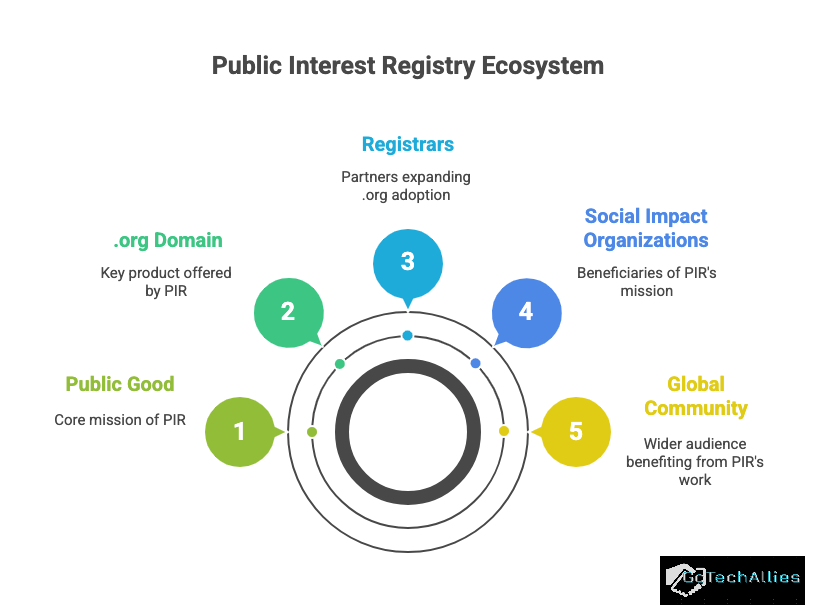
Donuts Inc. (New gTLDs)
Overview: Donuts is a leading registry for hundreds of new generic top-level domains (gTLDs) like .guru, .club, .photography, and many more. It manages approximately 14 million domains across these diverse TLDs, addressing niche markets and creative branding.
Business Model: Donuts focuses on portfolio breadth and targeting specialized communities, offering registrars a wide selection of new gTLDs that complement traditional endings.
Significance: As demand for creative and industry-specific domains grows, Donuts captures market segments underserved by legacy TLDs.

Afilias / Identity Digital
Overview: Afilias, now part of Identity Digital, operates around 22 million domains globally, acting as registry backend for several gTLDs and country-code TLDs (ccTLDs).
Business Model: It offers high-performance DNS infrastructure and backend registry services, providing technical excellence and operational scalability to gTLDs and ccTLDs alike.
Significance: Afilias/Identity Digital plays a key role behind the scenes enabling smaller TLD operators to maintain global reach and DNS reliability.

Afilias/Identity Digital contributes to domain management by providing DNS infrastructure for domain accessibility among others.
CentralNic Group
Overview: CentralNic manages about 12 million domains spanning a mix of new gTLDs and country-code TLDs, also operating its own registrar arm and providing API-driven domain platform services.
Business Model: A vertically integrated player offering both registry and registrar services, CentralNic focuses on developer-friendly tools and wholesale distribution.
Significance: Its hybrid model positions it competitively to serve enterprises, resellers, and growing ccTLD markets.

Nominet (.uk)
Overview: Nominet is the official registry for the .uk country code top-level domain, managing roughly 11 million registered domains primarily in the UK market.
Business Model: It functions as a national registry with strong ties to UK internet governance. Nominet also runs cybersecurity services and invests in internet infrastructure.
Significance: As the leading UK domain provider, Nominet plays a vital role in controlling national internet real estate and policy.

Nominet's pivotal role in UK internet governance
EURid (.eu)
Overview: EURid manages the .eu top-level domain, representing internet users across the European Union with approximately 4 million domains registered.
Business Model: Operates under an agreement with the European Commission to provide a trusted and secure namespace subject to EU regulations.
Significance: EURid supports European digital identity and compliance with strict data protection frameworks like GDPR.

The infographic illustrates EuRid's critical role in European digital identity
Neustar
Overview: Neustar operates a smaller portfolio of geographic and sponsored TLDs such as .us, as well as specialized domains serving government and enterprise sectors.
Business Model: Focuses on providing resilient registry infrastructure with enhanced security features and premium domain offerings.
Significance: While smaller in volume, Neustar plays a critical role in niche and regulatory-driven TLDs.
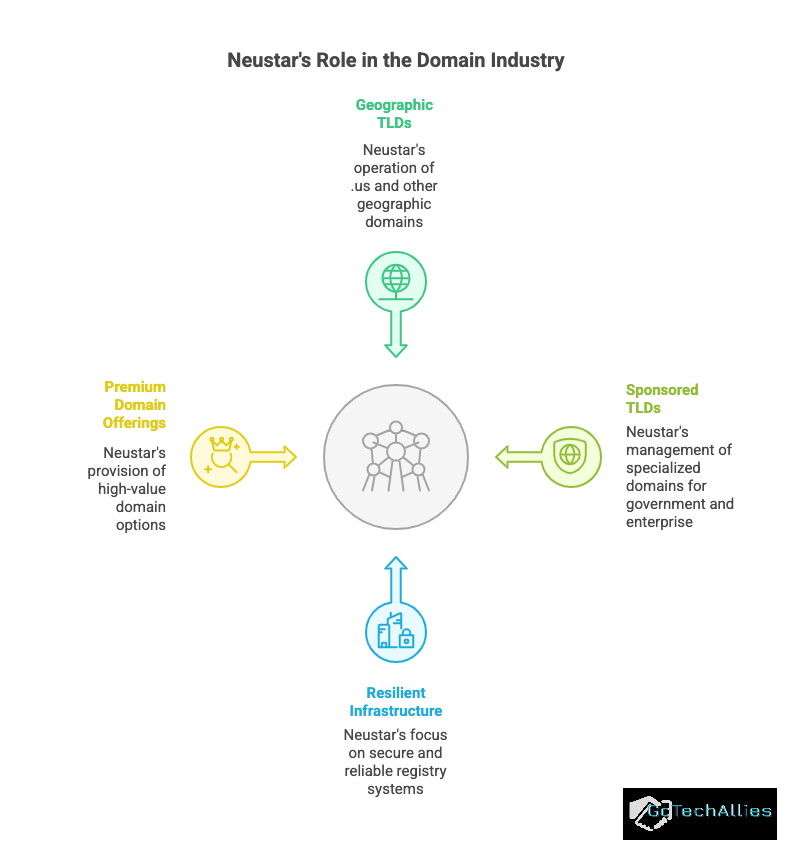
Table: Comparative Market Share of Leading Domain Registries (as of Feb/March 2025)

Domain Registrars
The largest registrars manage tens of millions of domains and operate worldwide, often as part of conglomerates offering hosting, email, and website builders.
GoDaddy
Overview: GoDaddy is the world’s largest domain registrar, managing over 60–84 million domain names as of 2025, accounting for more than 25% of all registered domains globally. This dominant market share solidifies its position as the most popular registrar in the domain name industry.
Business Model: GoDaddy operates as a vertically integrated registrar, offering not just domain registration but a broad suite of AI-powered tools for website building, marketing, hosting, and small business services. Through its “GoDaddy Airo” initiative, it leverages AI to streamline domain search, content creation, SEO, and customer engagement—transforming from a registrar into a full-service digital business platform.
Significance: GoDaddy’s aggressive integration of AI—from domain suggestions to site generation and marketing automation—positions it as more than just a registrar. It aims to increase customer lifetime value by bundling services and reducing friction for non-technical users. Its market dominance, coupled with a growing AI ecosystem, makes it a key player shaping the future of small business digital presence.

Namecheap
Overview: Namecheap is the second-largest domain registrar globally, managing between 14 and 20 million domains as of early 2025—representing approximately 14.25% of all registered domains. It consistently ranks just behind GoDaddy in domain volume, making it a key challenger in the registrar market.
Business Model: Namecheap operates as a value-driven registrar, bundling domain registration with web hosting, email, SSL, VPN, and security tools. Its "Site Maker" AI tool offers basic AI-powered customization for website creation, included in hosting plans. The company emphasizes transparent pricing, strong privacy protections, and security features such as Domain Vault and DDoS mitigation.
Significance: Namecheap differentiates itself through a strong commitment to privacy, affordability, and user trust—appealing to customers who value control and transparency. While its AI features are more modest than those of larger competitors, its clear brand positioning and focus on security make it a compelling alternative for both individual and small business users.
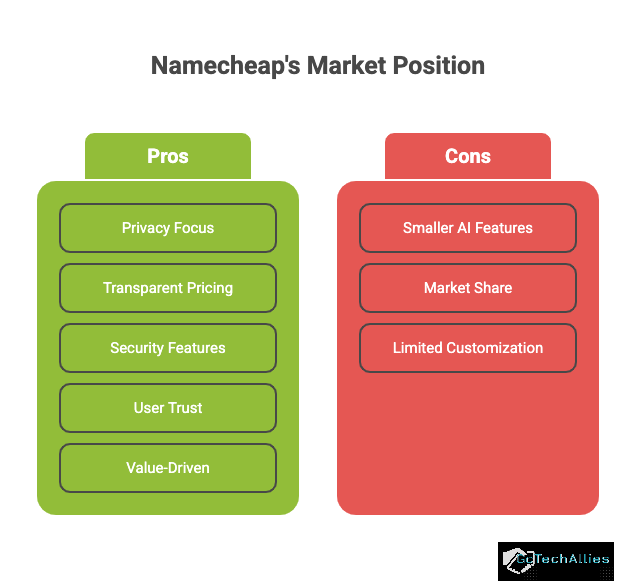
Tucows
Overview: Tucows is a major player in the domain industry, managing a total portfolio of approximately 29 million domains as of 2025. While its core registrar brand holds just over 9 million domains, much of its volume stems from subsidiaries like Enom, OpenSRS, and Ascio, positioning it as a dominant force in the wholesale domain market.
Business Model: Tucows primarily operates as a wholesale provider, powering large reseller networks and white-label domain services through brands like OpenSRS and Ascio. It monetizes through domain portfolio management (including parked domains and expired domain auctions) and has expanded into adjacent verticals such as fiber internet (Ting) and telecom software (Wavelo). Unlike consumer-facing registrars, Tucows focuses on infrastructure and B2B services rather than direct AI-enabled experiences.
Significance: Tucows represents the infrastructure backbone of the domain ecosystem, distinguishing itself from AI-focused, direct-to-consumer competitors. Its lack of visible generative AI integration in domain services suggests a strategic emphasis on stability, scale, and reseller enablement. This highlights a bifurcation in the market—between registrars innovating in AI-led user experience and those prioritizing wholesale dominance and platform resilience.
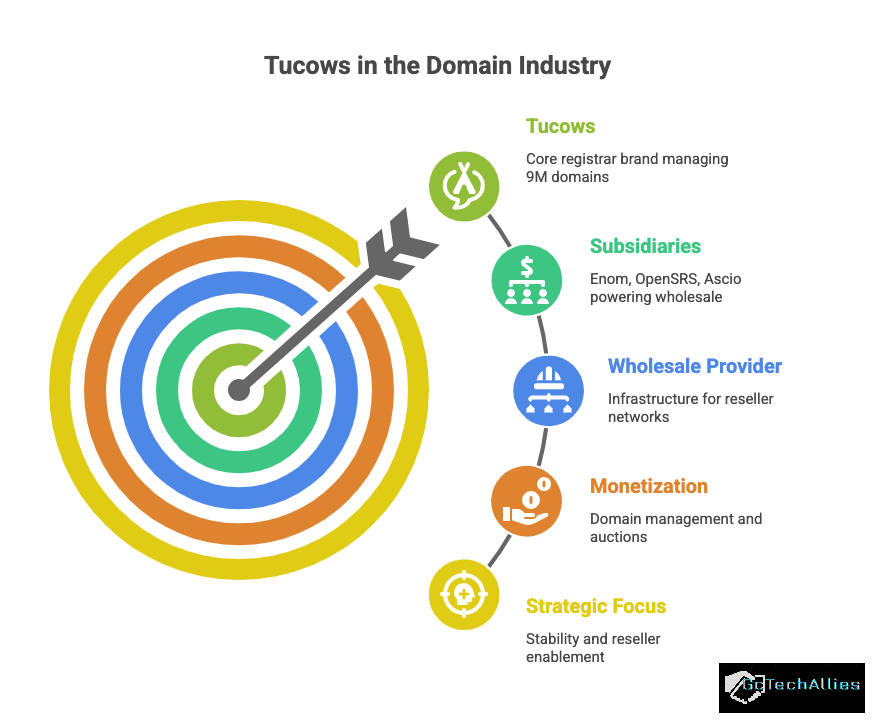
IONOS
Overview: IONOS manages over 22 million domains as of 2025, ranking as the 7th largest registrar globally with a 0.87% market share. It offers a wide range of domain extensions, competitive pricing, and streamlined domain transfer services.
Business Model: IONOS combines domain registration with a full suite of web presence tools, primarily targeting small and medium-sized businesses (SMBs). Its AI Website Builder generates entire draft websites based on business inputs, supported by tools like AI-powered text generation, image creation, color palette guidance, SEO metadata optimization, and structured content blocks. These AI features are tightly integrated with hosting, email, and VPS services to form an all-in-one platform.
Significance: IONOS is positioning itself as a comprehensive digital solution provider for SMBs, using AI to simplify traditionally complex tasks like web design, content writing, and SEO. Its deep integration of AI across its platform—particularly in creation and optimization workflows—distinguishes it as a competitive force in serving time-constrained, non-technical business owners seeking fast and professional web presence.
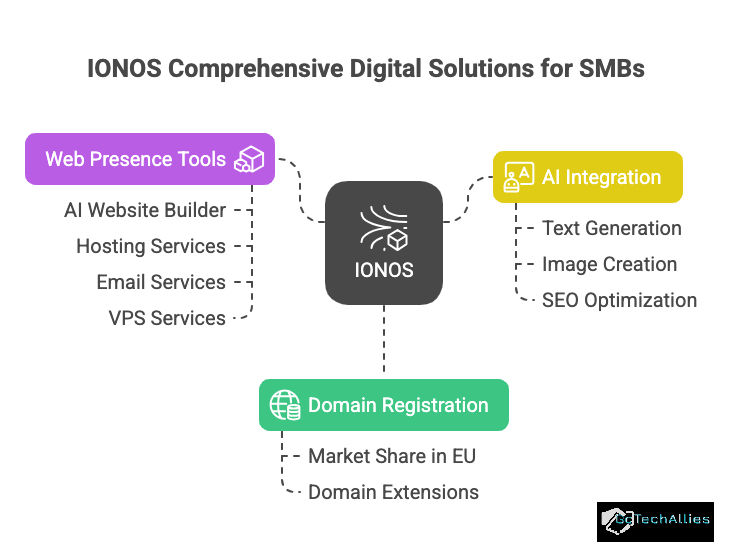
Squarespace
Overview: Squarespace is a leading Content Management System (CMS) and website builder, powering 2.0% of all websites and 3.0% of CMS-based sites. It holds a 1.17% share in domain registration with approximately 11 million domains under management, facilitated through Squarespace Domains LLC, Tucows, and Key-Systems.
Business Model: Squarespace operates an all-in-one platform combining domain registration, website creation, branding tools, and eCommerce capabilities. Its AI-driven tools streamline the entire digital presence journey—from business ideation to site launch. Core features include a Business Name Generator, Domain Name Generator, and Squarespace Blueprint AI, which builds customized websites in minutes. Additional tools like AI Website Copy and AI Section Backgrounds further enhance design and content alignment with brand identity.
Significance: Squarespace is evolving into an "AI-assisted creative partner," lowering the technical barrier for entrepreneurs and small businesses. Its integration of AI at every stage—naming, domain selection, layout, branding, and content—positions it as a frontrunner in delivering seamless, end-to-end web solutions for users seeking professional results without design or coding expertise.
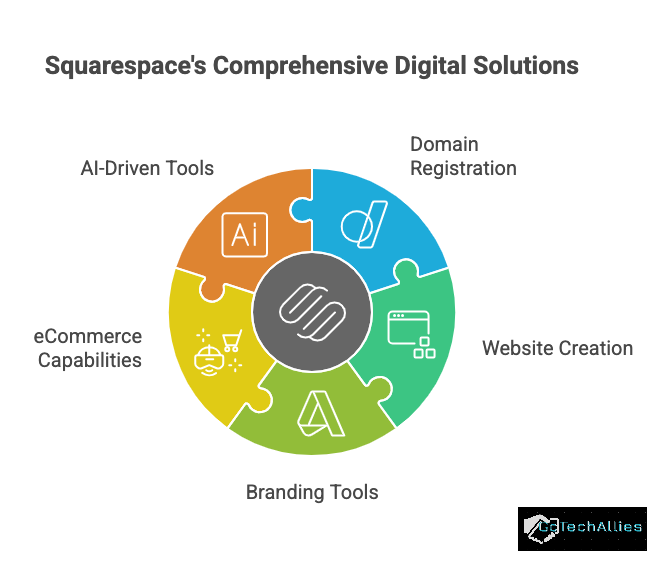
Porkbun
Overview: Porkbun is a mid-sized domain registrar, managing approximately 2.3 million domains and holding a 0.29% global market share. It ranks as the 26th largest registrar by volume.
Business Model: Porkbun’s strategy centers on delivering exceptional value by bundling features that are typically premium elsewhere—such as WHOIS Privacy, SSL certificates, email and URL forwarding, and Cloudflare DNS management—at no extra cost with every domain registration. Despite its smaller scale, Porkbun maintains the highest customer ratings among registrars on platforms like Trustpilot.
Significance: Unlike competitors investing heavily in AI, Porkbun has carved out a niche by focusing on transparent pricing, bundled essentials, and top-tier customer satisfaction. Its success underscores an alternative path to competitiveness in the domain industry—offering core value and simplicity, rather than feature overreach, as the primary lever for differentiation and loyalty.

Wix
Overview: Wix is a leading website builder and CMS provider, powering 2.7% of all websites globally. It holds a 3.9% market share in the CMS space and 13% in the broader website-building platform market. Wix is also an ICANN-accredited registrar for .com and .net domains, while reselling other TLDs.
Business Model: Wix offers an all-in-one platform that tightly integrates domain registration, website building, and hosting. Domain services are bundled with premium plans—often including a free domain for the first year—and include automated DNS configuration, SSL installation, and subdomain management. The company emphasizes a seamless user experience over granular customization or external complexity.
Significance: Wix’s strategic focus lies in simplicity and complete integration rather than in generative AI innovation. While it lacks the AI-driven features of competitors like GoDaddy or Squarespace, it excels in offering a frictionless setup process for beginners and small businesses. Its appeal is strongest among users seeking an intuitive, bundled solution rather than those requiring advanced automation or content generation tools.

Overview of Wix's Business Model and Market Position
Table : Comparative Market Share of Leading Domain Registrars (as of Feb/March 2025)
Registrar | Total Registered Domains (Approx.) | Primary Business Model |
GoDaddy | 81 - 84 million | Direct-to-consumer, All-in-one |
Namecheap | 14.5 - 20 million | Direct-to-consumer, Value-driven |
Tucows (OpenSRS, Enom, Ascio) | 29 million (incl. sub-brands) | Wholesale, Infrastructure |
IONOS | 22 million | Direct-to-consumer, SMB-focused |
Squarespace | 11 million | Website builder, Integrated platform |
Porkbun | 2.3 million | Direct-to-consumer, Value-driven |
Wix | 6+ m live sites (not all registered with the platform) | Integrated platform for SMBs |
Domain Resellers
The reseller landscape is fragmented, dominated by platforms empowering agencies, SaaS firms, and hosting companies to retail domains as add-ons.
OpenSRS (Tucows)
Overview: OpenSRS powers domain services for over 13,000 resellers worldwide, including major SaaS platforms such as Wix, Squarespace, and Shopify. It plays a critical role in the backend infrastructure of domain provisioning for some of the most prominent website builders globally.
Business Model: Operates a fully white-label, API-driven platform that enables resellers to build their own domain businesses. Resellers can set their own pricing, manage customer experiences, and integrate domain services into broader product offerings. The platform also offers complementary products such as SSL certificates and professional email, tailored to large hosting providers, web agencies, and platform companies.
Significance: OpenSRS is a key infrastructure provider in the domain ecosystem, enabling other platforms to offer seamless domain registration and management without building their own registrar systems. Its scalability, white-label flexibility, and focus on enterprise-grade integration make it central to the wholesale registrar segment and critical to the growth of the broader web services market.

Enom
Overview: Enom is one of the largest wholesale domain registrars, supporting a network of over 22,000 reseller partners globally. It serves a broad mix of web hosting companies, digital agencies, and independent resellers.
Business Model: Enom offers a flexible API integration alongside customizable storefront tools, enabling partners to resell domains, email, SSL certificates, and hosting services. It provides tiered pricing structures and a suite of value-added features such as WHOIS privacy, ID protection, and DNS management, catering to both entry-level and enterprise resellers.
Significance: As a foundational player in the wholesale registrar market, Enom empowers thousands of resellers to deliver branded web services at scale. Its long-standing infrastructure and breadth of services reinforce Tucows’ dominance in the backend of the domain economy, especially for businesses that prefer white-label, API-first solutions.

PublicDomainRegistry (PDR)
Overview: PublicDomainRegistry (PDR) is a specialized backend domain registrar designed to support resellers rather than direct end-users. It is one of the largest wholesale-focused registrars globally.
Business Model: PDR powers domain provisioning for a wide network of reseller partners, offering a white-label, API-driven platform for domain registration and related web services. It operates behind well-known brands such as ResellerClub and UK2, providing the technical infrastructure that enables these brands to manage large-scale reseller ecosystems.
Significance: PDR plays a foundational role in the wholesale domain market, supporting thousands of resellers with scalable, backend automation. Its tight integration with related brands and focus on indirect distribution channels makes it a key infrastructure player within the domain name industry.

ResellerClub (Newfold Digital)
Overview: ResellerClub, a brand under the Newfold Digital umbrella, is a well-established domain and web services provider with a particularly strong footprint in Asia and emerging markets. It is widely recognized among web professionals and digital agencies.
Business Model: Operating primarily through a reseller-first model, ResellerClub offers a broad suite of white-label tools, including domain registration, hosting, website builders, email solutions, and security products. The platform is built to empower resellers with flexible pricing, storefront customization, and API access.
Significance: ResellerClub serves as a key growth engine for Newfold Digital in developing markets, providing localized solutions and infrastructure to thousands of small agencies and IT service providers. Its integrated product offering positions it as a go-to platform for full-stack web presence reselling.
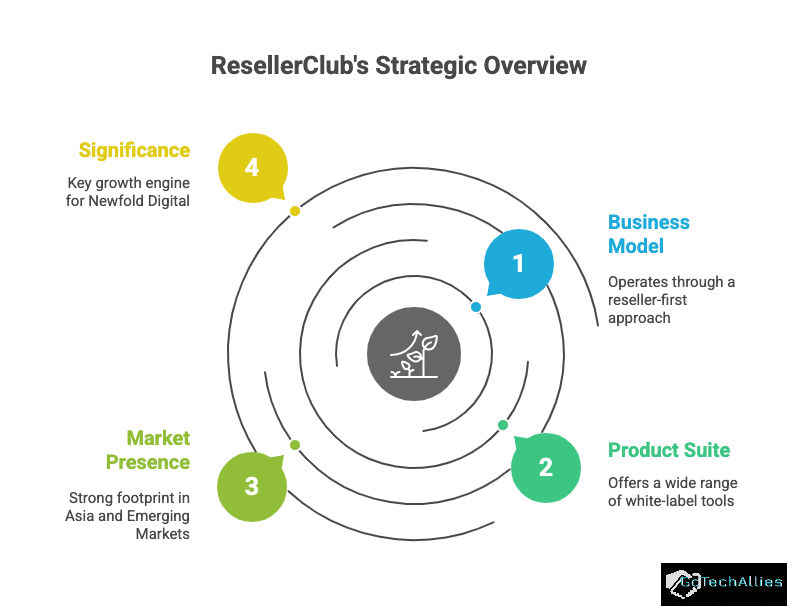
Namecheap Reseller
Overview: Namecheap operates a reseller program tailored for domains and SSL certificates, attracting agencies, IT service providers, and SMB-focused resellers through its accessible entry point and recognized brand.
Business Model: The program uses a tiered loyalty discount system, where resellers receive progressive pricing benefits based on purchase volumes. The SSL reseller program offers four discount levels, with full support for automation via API, making it suitable for both smaller resellers and more established partners.
Significance: By leveraging Namecheap’s brand strength and competitive pricing, the reseller program enables smaller players to enter the domain and SSL resale space easily. Its volume-based rewards model supports long-term loyalty while offering operational flexibility through white-label and API tools.
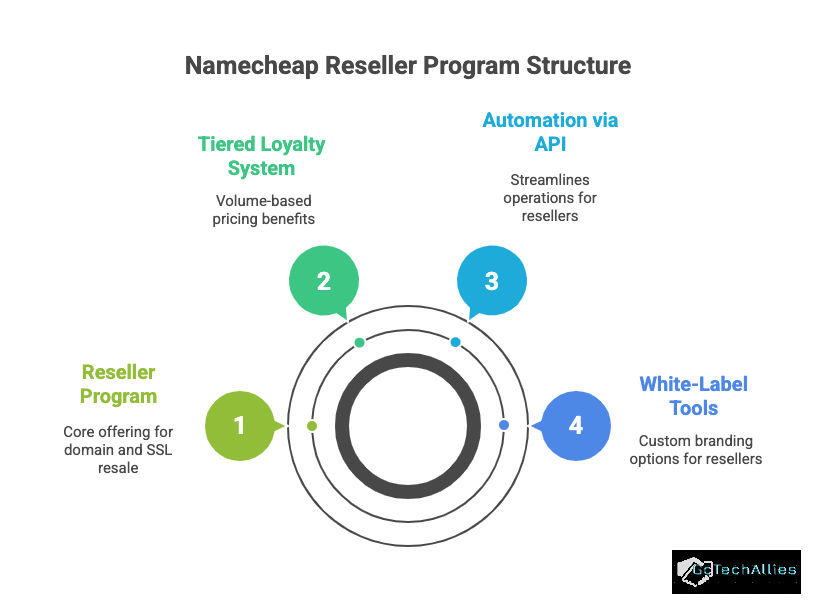
Domain.com Reseller
Overview: Domain.com supports a reseller and affiliate model that primarily targets bloggers, influencers, and small-scale affiliates looking to monetize traffic rather than operate full-service domain reselling businesses.
Business Model: Rather than offering a traditional white-label platform, Domain.com focuses on a referral-based approach, where users earn up to 30% commission on sales or receive account credits. This model requires minimal technical setup and appeals to partners looking for a simple promotional structure.
Significance: Domain.com’s affiliate-centric strategy emphasizes reach and accessibility over infrastructure, making it an appealing option for content creators and micro-influencers. While it lacks the deep customization and automation found in other reseller platforms, it lowers the barrier to entry for earning revenue through domain sales.

NuSec
Overview: NuSec provides white-label DNS, security, and hosting infrastructure specifically designed for retail registrars and resellers seeking to enhance their technical offerings.
Business Model: The platform offers premium DNS services (NuDNS), DDoS protection, and integrated web security solutions, all built for seamless integration into third-party environments. NuSec enables partners to resell under their own brand, offering advanced infrastructure without building it in-house.
Significance: NuSec plays a critical role in strengthening the backend capabilities of registrars like NameSilo, helping them deliver enterprise-grade DNS and security features. Its focus on white-label delivery and robust protection tools makes it a valuable enabler in the domain reseller ecosystem, particularly for those prioritizing performance, security, and scalability.
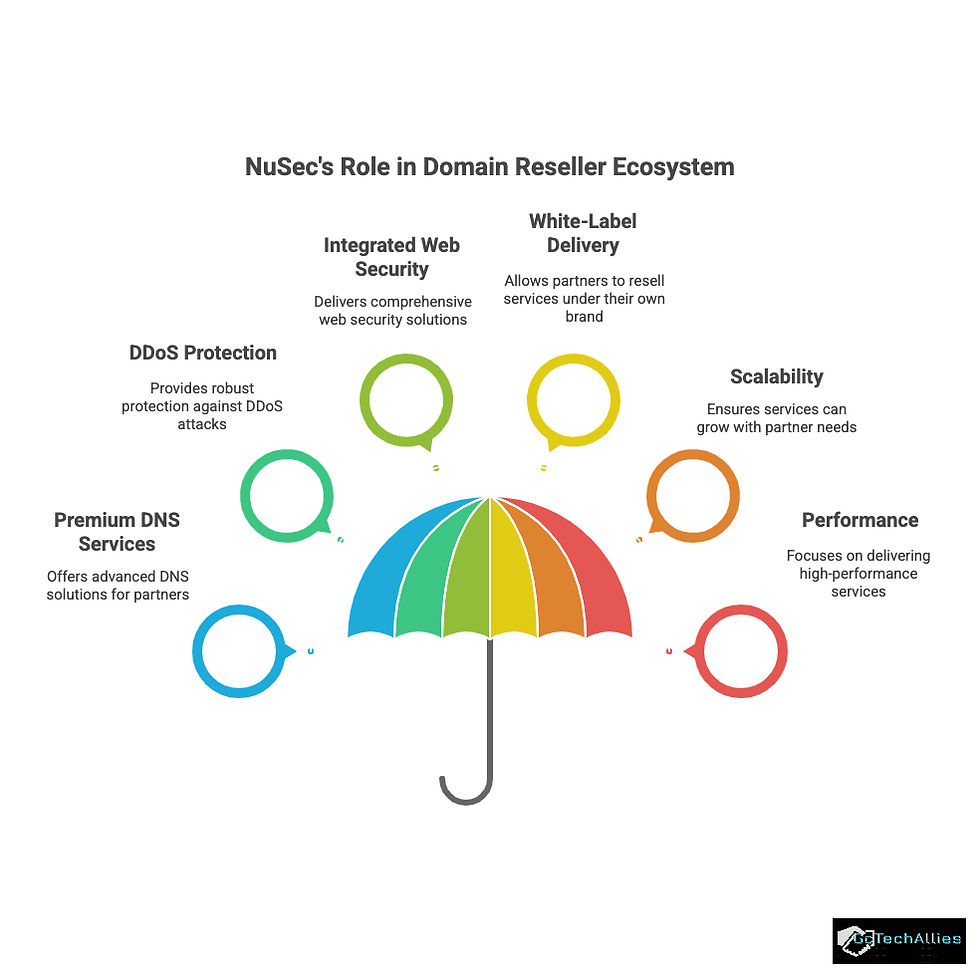
NameSilo
Overview: NameSilo is a popular registrar among agencies and web professionals, known for its developer-friendly APIs, bulk domain management tools, and competitive pricing.
Business Model: It offers custom branding and white-label capabilities, along with a suite of portfolio management tools that cater to high-volume users. Its open infrastructure supports automation and scalability for resellers and domain investors.
Significance: NameSilo stands out by combining affordability with flexibility, making it a go-to choice for agencies, developers, and SMB resellers who require streamlined workflows and strong control over their domain portfolios.

NetEarth One
OverviewNetEarth One is a wholesale-focused domain and hosting provider, catering primarily to small and medium-sized web service providers.
Business Model: The platform emphasizes competitive pricing, reliable infrastructure, and direct reseller support, enabling partners to offer domains and web services under their own brand. It operates with a low public profile, prioritizing B2B relationships.
Significance: While less visible in consumer-facing channels, NetEarth One plays a key role in the independent reseller ecosystem, offering a dependable backend for web hosts and agencies seeking control and margin-friendly solutions.

These platforms play a central role in the domain industry’s supply chain, providing essential infrastructure and business tools for a global market of agencies, web professionals, and retail registrars. While scale, automation, and white-label flexibility remain common themes, ecosystem integration (with SaaS and hosting), regional focus, and value-added services are critical differentiators for success in 2025.
Table: Comparative Market Share of Leading Domain Resellers (as of Feb/March 2025)
Reseller | Estimated Global Resellers | Main Business Focus | Unique Traits / Offerings |
OpenSRS (Tucows) | 13,000+ | Wholesale domain platform for resellers; used by major SaaS website builders | Sub-reseller features; white-label platform; robust API; flexible pricing; used by Wix, Squarespace, Shopify |
Enom | 22,000+ | Domain, email, and SSL API-based reseller platform | Tiered reseller plans; value-added services (hosting, SSL, email); developer-centric API; storefront tool |
PublicDomainRegistry (PDR) | Not public | Dedicated to reseller channel, not direct sales | Backend provider for multiple brands; tightly integrated with ResellerClub; strong in emerging markets |
ResellerClub (Newfold Digital) | Not public | Domain and hosting reseller leader, especially in Asia/EM | Part of Newfold Digital; vast web professional ecosystem in Asia; integrates with other Newfold services |
Namecheap Reseller | Not public | Tiered reseller program for domains and SSL with loyalty discounts | 4-level pricing; focus on volume-based pricing; supports agencies and high-volume resellers |
Domain.com Reseller | Not public | Referral and affiliate-based domain and hosting reselling | Affiliate program with 30% commission; referral credits for hosting and domain resales |
NuSec | Not public | White-label DNS and security solutions for resellers | Premium DNS (NuDNS) with DDoS protection; partners with registrars for white-label infrastructure |
NameSilo | Not public | Registrar with robust reseller and sub-account options | Free open API; deep discounts for bulk; strong for agencies and portfolio management; white-label branding |
NetEarth One | Not public | Domain and hosting reseller-oriented business | Focus on smaller hosting businesses; competitive wholesale domain pricing |
Under-Explored Strategic Partnerships in the Domain Name Industry
🌍 Web3 and DID Providers × Traditional Registrars
Opportunity: Bridge traditional domains with decentralized identity (DID) and blockchain-based naming (e.g. ENS, Unstoppable Domains)
Who should partner: GoDaddy, Tucows × ENS, Unstoppable Domains, Ceramic
Why: Domains as verified identities and asset layers (wallets, tokens, Web3 handles) are on the rise, but registrars aren’t offering .eth/.crypto domains or linking them to DNS records.
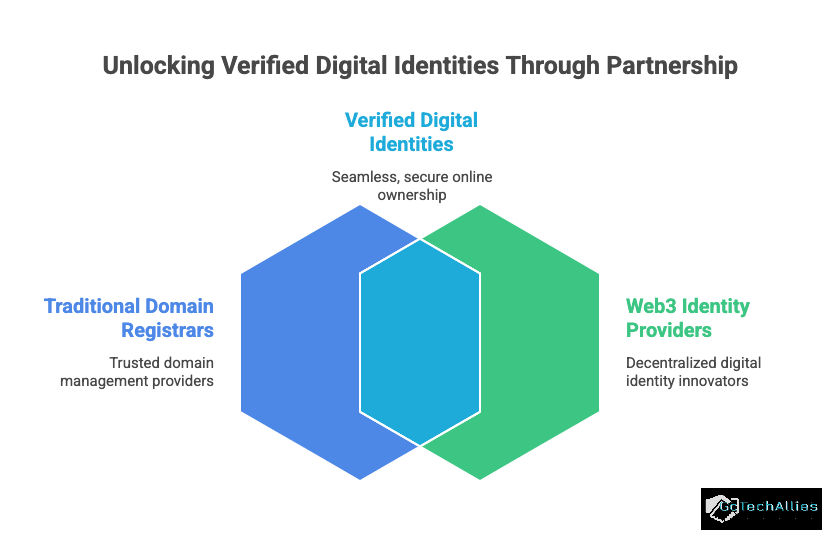
Partnerships between Traditional Domain Registrars and Web3 Identity Providers enable seamless, secure digital identities.
📦 E-commerce & Marketplace SaaS × Resellers or Registrars
🚀 Opportunity: Bundle branded domain presence into eCommerce tool stacks
Who should partner: Stripe Atlas, Gumroad, Etsy × Namecheap, IONOS, OpenSRS
Why: Sellers on these platforms often launch without real branding (no domain, SEO, email). A simple domain onboarding flow via embedded APIs can increase professionalization and trust.
Missed potential: Convert millions of "link-in-bio" or Etsy-type users into domain buyers.
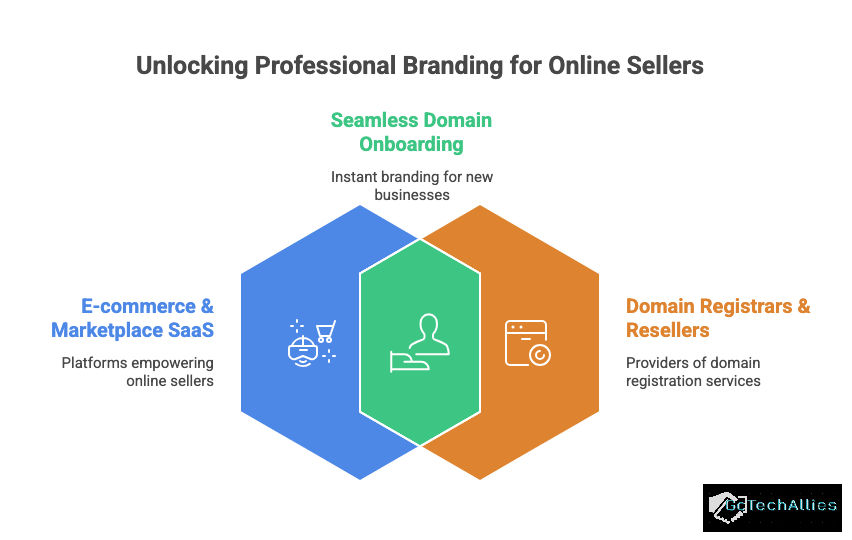
🛰️ Telecom & ISPs × TLD Registries
🚀 Opportunity: Bundle national ccTLDs with telecom plans
Who should partner: Nominet, EURid × ISPs or 5G operators
Why: National/regional registries could embed domain registration into business internet plans or small business bundles, especially in underpenetrated TLDs.
Missed potential: ccTLDs like .eu and .uk could revive adoption through bundled partnerships and regulatory incentives.
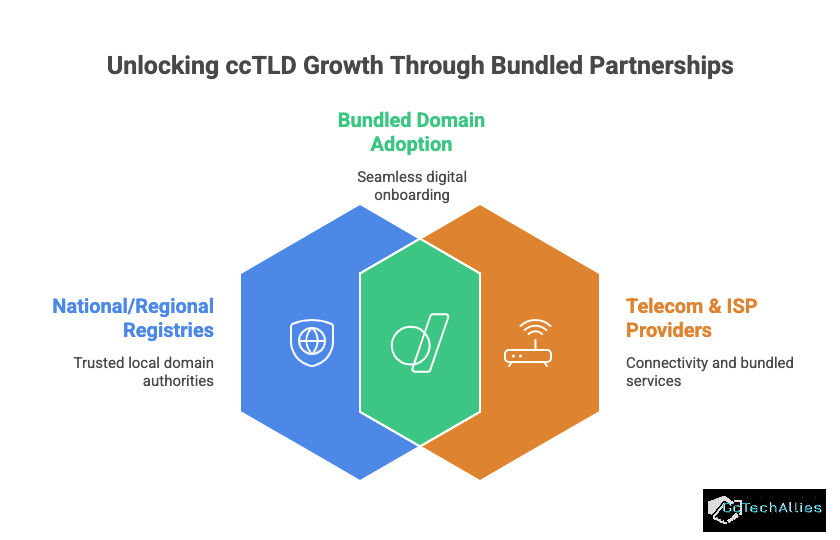
🤝 Specialized AI Model Providers × Domain Platforms
🚀 Opportunity: Integrate advanced AI capabilities without internal R&D burden
Who should partner: GoDaddy, IONOS, Squarespace × Hugging Face Enterprise, AWS Bedrock, Azure AI Studio
Why: Most domain platforms are building basic AI tools (e.g., name suggestions, site builders). Integrating with specialized AI providers would unlock advanced content generation, multimodal interfaces, and real-time translation at scale.
Missed potential: Stay competitive in the AI race without overspending on in-house model training or infrastructure.

🔐 AI-Powered Cybersecurity Firms × Registrars and DNS Operators
🚀 Opportunity: Move from reactive to proactive domain protection. This goes beyond standard SSL certificates and basic DDoS protection to include AI-driven anomaly detection in DNS traffic, automated identification of malicious domain registrations, and real-time protection against evolving cyber threats
Who should partner: CentralNic, Tucows, GoDaddy × Vectra AI, CrowdStrike, Darktrace, SentinelOne
Why: The domain industry faces rising threats: phishing domains, DNS tunneling, malware distribution. AI cybersecurity firms offer predictive analytics, anomaly detection, and automated domain abuse takedowns.
Missed potential: Differentiate by offering enterprise-grade, AI-driven DNS protection bundled with domains.

Table: Unexplored Partnership Types for the Domain Name Industry
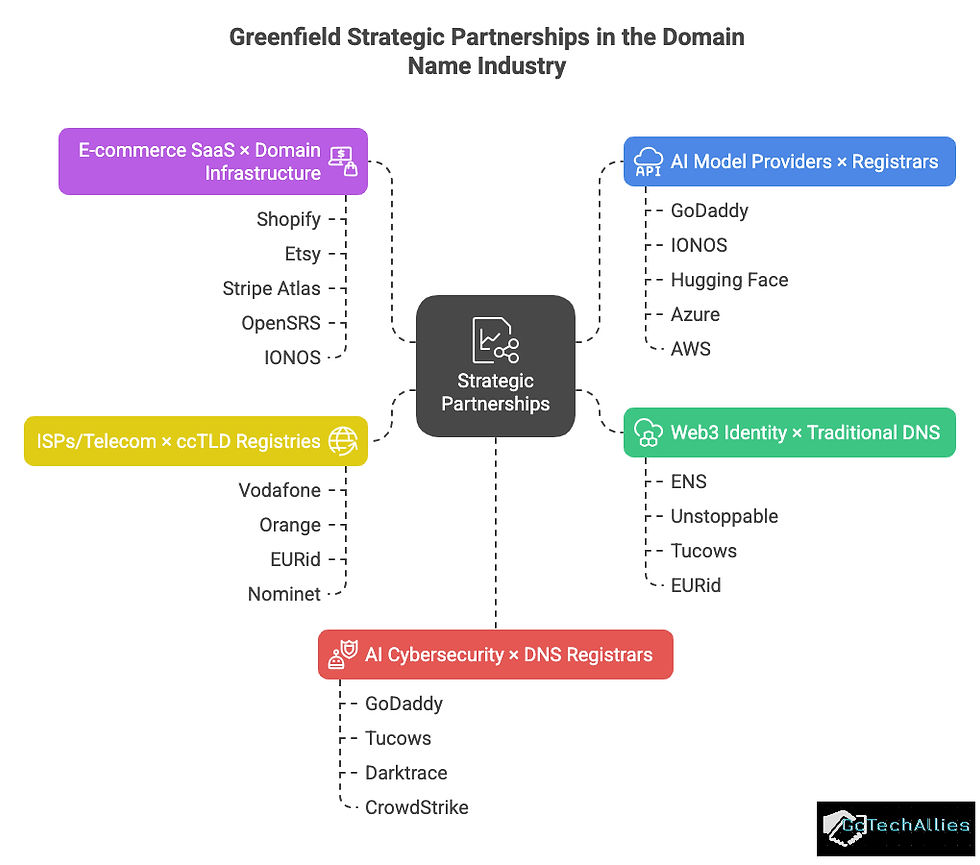
✅ Conclusion & Strategic Implications
The Domain Registry Space, while often perceived as a mature and commoditized industry, remains a dynamic and evolving ecosystem with critical relevance to digital infrastructure. Dominated by a handful of registry and registrar giants like Verisign, GoDaddy, and Namecheap, the market is undergoing a quiet transformation driven by the convergence of AI, Web3, cybersecurity, and vertical SaaS platforms.
As global internet usage deepens and more businesses and individuals establish online identities, domain names continue to serve as foundational digital assets. While traditional TLDs (.com, .org, .net) remain dominant, the expansion of new gTLDs and the rise of ccTLD adoption present both challenges and opportunities for diversification and localization.
Simultaneously, the competitive edge is shifting from pure registration volume to value-added services—especially those powered by artificial intelligence. AI-driven site builders, content generators, security tools, and business onboarding experiences are becoming critical differentiators. Platforms like GoDaddy, IONOS, and Squarespace exemplify how AI is not just augmenting domain services but redefining customer expectations.
Moreover, the reseller landscape—historically fragmented and infrastructure-focused—is ripe for innovation through strategic partnerships. From embedding domains into eCommerce platforms to bridging DNS with decentralized identity providers, the next wave of growth lies in integrated, context-aware offerings that meet users where they already operate.
For players across the value chain—whether registries, registrars, resellers, or infrastructure providers—this moment represents a strategic inflection point. The industry must not only respond to emerging threats (cybersecurity, privacy, regulatory compliance) but also proactively seize under-explored alliances that align with AI transformation, Web3 ecosystems, and vertical SaaS expansion.
In summary, the Domain Registry Space is no longer just about selling domain names—it's about orchestrating trust, identity, and functionality at the edge of every digital experience. The winners of the next decade will be those who understand this shift and architect platforms, partnerships, and policies that reflect the full potential of the domain name as a dynamic digital asset.
Author
Gianluca Caccamo, leader in connecting C-level with Data for Strategic Partnerships, counting more than 15 years of experience at companies like Google, Pinterest and Wix among others. Currently advising companies on E-commerce, Advertising, Saas and AI.
Sources
https://www.cognitivemarketresearch.com/domain-name-registrar-market-report
https://register.domains/en/blog/european-domain-names-complete-guide
https://straitsresearch.com/report/domain-name-registrar-market/europe
https://www.businessresearchinsights.com/market-reports/domain-name-registrar-market-120518
https://www.openprovider.com/blog/how-many-domains-are-there
https://www.grandviewresearch.com/horizon/outlook/domain-name-system-dns-tools-market/europe
https://www.datainsightsmarket.com/reports/domain-name-1439796
https://www.forbes.com/advisor/business/software/best-domain-registrar/
https://registrars.nominet.uk/uk-namespace/registrar-agreement/list-of-registrars/
https://en.wikipedia.org/wiki/List_of_Internet_top-level_domains
https://stablepoint.com/blog/best-domain-resellers-and-how-to-choose-one
https://www.reddit.com/r/msp/comments/1bw1d8n/recommendations_for_domain_registrars_with/
https://www.iana.org/assignments/registrar-ids/registrar-ids.xhtml
https://www.dominios.es/en/agentes-registradores/nuestros-agentes-registradores
https://european-alternatives.eu/category/domain-name-registrar
http://www.100bestdomainnames.com/about-registrars/best-domain-resellers/






Comments